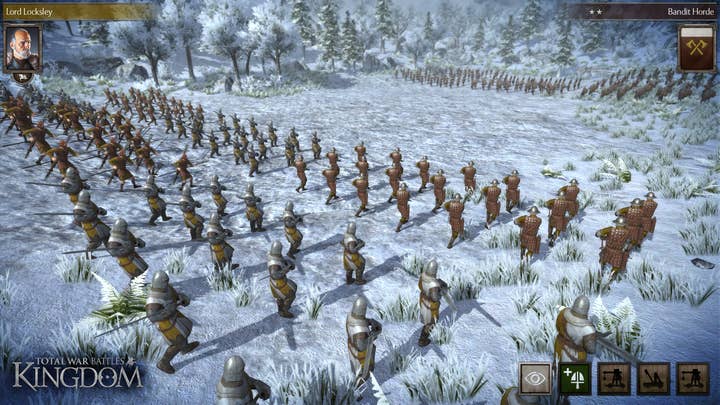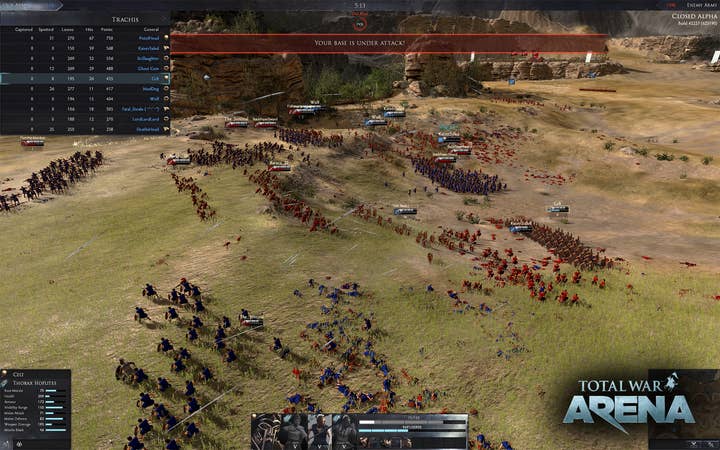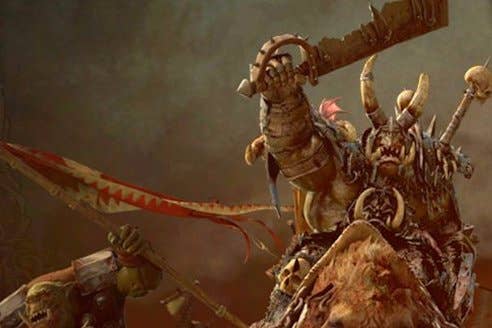Arena, Kingdom and Warhammer: 15 Years of Total War
With fantasy, free-to-play and mobile, Creative Assembly's key IP is conquering new ground
Somewhere, in a dusty set of boxes in a loft just outside Newmarket, my army waits. Their stomachs need no provisions, their weapons no oil. A force of thousands sits silently in rank and file, stoically awaiting a call to battle which may never come. Except the squigs - they're probably pretty pissed off by now.
I was an orc general: a warlord. Before Peter Jackson, before Blizzard, it was Games Workshop which defined the Greenskins. Anarchic, disorganised, blindly furious: It's easy to see why they appealed to a young man in his early teens. I collected them with fervour, read their bestiary cover to cover almost endlessly, painted them with clumsy but eager hands. I think I only actually fought with them once, and it was not a particularly spectacular battle. My dad, more used to marshalling his his huge American Civil War and Napoleonic armies, had with some resignation put together a fairly rudimentary force of dwarves - a few units of axes, hammers and muskets; some greybeards and a cannon or two - perhaps a team of halfling skirmishers. I think I loaned him a couple of dipsomaniacal ogres.
I shouldn't have. A far superior general, he wiped the valley floor with my magnificent army - Bigguns and Black Orcs swept away just as easily as my puny night goblin archers and the jack-in-the-box fanatics that I'd so proudly concealed within. My doom divers all splashed harmlessly into hillsides, my trolls stood stock still, occasionally taking the odd swipe at their handlers. Even my trusty squigs were useless. Grottsy Stinkenfang, boss of the Doomslingers, was vanquished. I was obliterated, but I had a fantastic time.
The point of all this self-indulgent autobiography is that every time I play a game of Total War I'm reminded of these happy memories. The smell of flock, the hiss of the tape measure, the sweaty palmed dice-roll of the cavalry charge. Creative Assembly's work has always managed to capture the god-like feeling which the shifting of miniatures conveyed, wrapped up in a strategic meta-game which the physical counterpart could never hope to emulate. For fifteen years, though, they've always been about serious, grown-up wars. About history. I love a bit of history, but a part of me had always itched to unleash the squigs on those horrible little stunties and take revenge for the slaughter of Sweaty Gorge. I wasn't the only one. Total War: Warhammer is coming.
"Being able to start casting comets down from the sky and having dragons breathe fire on 10,000 men at once is a really interesting departure," Total War brand director Rob Bartholomew tells me, with a genuine enthusiasm. "We've got to absolutely get that sense of spectacle right and do that justice. It's really a sight to see when you see a giant wading into the melee for the first time, sort of sweeping his club through 200 Empire guys."
Warhammer certainly marks a departure for the series. It's the first time that the team has ever been let loose on a realm born of imagination, not historical fact, a world with some levity. There's just as much lore and research involved, if not more, but Bartholomew says that the change of pace is a welcome one.
"It's great to be able to create a Total War game that actually just suspends the physical world for a little while, and sort of breaks and bends the laws of physics, and just does something that turns everything up to 11. We've always had an engine that's capable of it, but we've always toned it down to make it the realism and the history that we were going for.
"We don't want to do anything that completely breaks the way that game works, the way that the player would expect the game to work."
"We don't want to do anything that completely breaks the way that game works, the way that the player would expect the game to work. But, at the same time, magic, fantastic heroes, and giant creatures are really new to the game and we really want to amp them up and make them the stars of the show."
Whilst this is full tilt into the fantasy realm, the series isn't moving away from its roots in complex simulation, either. Just because what you're simulating never existed doesn't mean it can't be accurate.
"They'll still see that incredible depth of strategy, those really interesting tactical battles that we're well known for, and hopefully, they'll come with us and get the idea that we really want to communicate to them, which is 'sure, it's dragons and it's orcs and elves and it's everything else, but, that just gives you more tactical options. You've got more stuff to worry about.'

"When a wizard casts a fireball across a battlefield, it adds something else that you've got to worry about in game, something that you've got to work with, and you've got to work around, so we still want that depth. We still want those many thousands of game play hours to be there. Rome 2 and Attila and our recent releases have taught us where to place our priorities."
Priorities will be key. Warhammer's lore is vast and varied, with dozens of factions and hundreds of wildly different units. Managing the way that's presented is going to be a challenge - and one which brings the series up against one of its more contentious issues: the handling of DLC.
"In Attila we have something like 5 or 6 different animated skeletons," Bartholomew tells me. "We've got a human, a dog, a camel and a horse and what have you. In Warhammer, we've got something like 60+ across the trilogy. So, it escalates out of control massively, and the only way that we can contain that within a normal price for a game is to start breaking that into understandable chunks and releasing it in sequence, and hoping that we're providing really great value for our fan base, and that they see that and come with us.
"We're always really sensitive to what the fans say about the volume of DLC and what the DLC is, and whether the DLC's worth buying, or whether they feel it's been cut out of the main game, and to a certain extent, you'll always have that line that you're drawing, that's never going to satisfy everyone. We recently released the Celts DLC for Attila and we got a lot of feedback on the forum saying, 'This should have been included in the main game'. I think some of us would agree, but if we did, then we would have had to have dropped something else out of the main game in order to make way for it.
"We're always really sensitive to what the fans say about the volume of DLC and what the DLC is, and whether the DLC's worth buying, or whether they feel it's been cut out of the main game"
"There's a finite amount of resources that we can put into making a game to sell it at a certain price point, and the fans don't always necessarily want to hear that or appreciate that, but unfortunately that's the choice we always have to make when we're making games in order to ensure they're successful."
As a result, Warhammer will ship with four factions: Orcs, Empire, Dwarves and Vampires. It'll be the first in a series of three games in the universe, with each follow up being a standalone "Attila-sized" expansion, which can either be played alone or added into the first game. The end result, says Bartholomew, will be the biggest single Total War game that the team has ever created.
As excited as I am about the prospect of Warhammer, there's a risk here, as there is when any established IP takes a step outside it's normal patrol route. There are now five teams working on different Total War properties - not just with the new subject matter that Warhammer represents, but with the new platforms and models of the free-to-play Total War: Arena and the cross-platform PC/tablet development of Total War Battles: Kingdoms. With the knowledge that faithful audiences can also be a little stubborn, is Bartholomew worried that new directions might alienate as many as it attracts?
"Absolutely, there's always a risk. It's always something we bear in mind. Obviously, as you can imagine, it's something that we've talked a lot about over the last few years: where we're going and where we want to be and what the rest of the market looks like. If you look at the amount of games being released these days, certainly on mobile platforms in the free-to-play market, there's a lot of blandness out of there to try and come to a lowest common but highest volume denominator in a way.
"It's not to do it a disservice or a discredit at all, but it's not the kind of game that we particularly want to make. I think when we look at the success we've had, we've had success in creating, we throw this phrase around a lot: the idea of a 'thinkers choice'. Can we be the slightly more mature, more grown up, deep, delivering those hundred thousands of hours of game play? Can we be the kind of game that, if you think that Angry Birds is fun but it's perhaps a bit too light for you to have your attention for too long, then we want to be the option where you're picking something that you feel matches your level of intelligence and the kind of time that you want to spend with gaming.

"I think that that very much colours our approach to those markets, which are otherwise filled with a lot of the blandness that all feels like the same game done over, and over, and over again. We're not worried, we're not concerned about being too hardcore in those markets. In fact, if we come down to it, we'd rather be leaning more on the hardcore side of the fence than not, because we think that gives us distinction in the market, and we thin that that plays to our strengths that we've established over the last 15 years."
Renaud Charpentier, the designer brought in to oversee the development of Battles, is in agreement. Since day one it's been his job to make sure that both of these new branches of development retain the essential properties of the series, that they're Total War through and through.
"It was always intended to be much more pick up and play without sacrificing any of the depth or complexity or challenge," he explains to me. "It's a very interesting thing to do. From the start the idea was to never interfere with the development of the core game. I think the core point is that it's another way to be able to play Total War. As you can see from Warhammer and Attila, we still have dedicated core team that's making the series evolve - if you look at what Total War was ten years ago, it's very different. This will keep evolving. The other thing we do, and Kingdom and Arena are the two most prominent examples, is to propose other ways to play. That's what differentiates these games - the way they're played.
"The average session length for Total War is measured in hours - that's what's great about it. It will stay like that, the fans shouldn't have any fears about that stopping. The other proposals that the teams are working on don't hamper the original in any way, they're separate teams.
"The other thing we do, and Kingdom and Arena are the two most prominent examples, is to propose other ways to play. That's what differentiates these games - the way they're played"
"Kingdom's session is maybe 30 minutes. Arena is between: right now the battles last around 10-15 minutes, although that might change. You can fire that up and get straight to the point - very clever automatic matchmaking, it's much more straight forward.
"Kingdom is at the other extreme to Attila, it's a pick-up game. The battles in Kingdom are meant to resolve in less than three minutes, usually two. Very quickfire action. Working on your realm, on economy or your base of operations, you can also do something meaningful in a couple of minutes. The big driver for that is for making it cross-platform. So whether you're at your PC or your iPad, you might just have five minutes, you can get something interesting done.
"I think when you design a game something very important, but often overlooked, is not just to know what your game is, but to know what the intended usage or consumption habit will be. What we do with Kingdom and Arena is to promote a broader scope of consumption habit across the same brand without changing what the game is about. They're all thinking games, but the way you consume them is very different."
Both Charpentier and Bartholomew assure me that, even with these new approaches hopefully broadening the audience which Total War appeals to, the core game of historical warfare will remain at the very centre of what the studio does. A return to the era of Empire is hinted at, but I'm also reminded that "We're not running out of wars any time soon." Other IP has been looked at, too, with a "list of everything everyone's ever thought of" sitting somewhere on the desk of creative director Mike Simpson. For now, though, the five teams have their hands full. The time for the revenge of Grottsy Stinkenfang is nigh.











